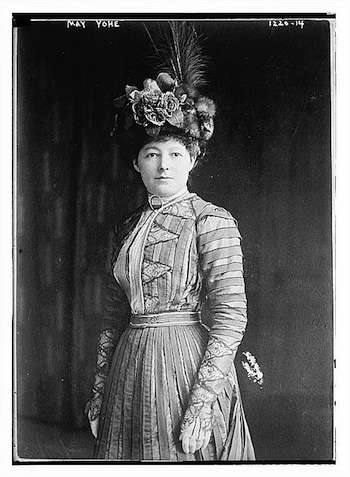This Just Out: May Yohe, Queen of the Naughty Nineties Biography
A new biography explores the story of the famous diva who once owned the Hope Diamond
![]()
May Yohe epitomized the Naughty Nineties. Larger than life, Yohe burned a path to greatness from humble beginnings in Bethlehem, Pennsylvania. Known for her sexuality and contralto voice that allowed her to take on male roles, Yohe scandalized audiences just as much on stage as off. Headlines of her rumored affairs captured public attention and when she married Lord Francis Hope, owner of the Hope Diamond, in 1894, her standing within high society seemed assured.
But after divorcing him eight years later, her life took a tumultuous turn. She ended up doing 10-cent vaudeville shows around the United States and traveling the world sometimes having to perform to raise funds for the next leg of the trip.
Throughout her life, Yohe continued to scrap by. If she wasn’t helping to write and create movie serials about the curse of the famous diamond that she had once owned (though may have never actually worn), she was working as a janitor in a steamship yard. Yohe married twice more, her profile rising and falling with every decade, until she died in 1938 at age 72.
Now Richard Kurin, the Smithsonian Institution’s under secretary for history, art and culture and the author of a book about the Hope Diamond, has written the first biography of Yohe. Madcap May: Mistress of Myth, Men and Hope, a riveting illumination of her nerve, verve and resilience, arrives in bookstores on September 4th.
I interviewed Kurin about Madcap May:
What was it that drew you to her story?
Well, I mean she was larger than life. She lived more than one lifetime. When you start thinking about all the things that she did: that many lovers and husbands at that time, to go to the height of fame in the British theater at that time—this is the time of Gilbert and Sullivan and George Bernard Shaw, so to be so successful and then end up playing in ten-cent vaudeville theaters, really in poverty, and running a chicken, and running a tea plantation, and a rubber plantation! She did so much more than any one human being, it’s kind of hard to imagine.
Falling in and out favor as she did, how do you think audiences will receive her today?
On one hand, she’s not that likable, so I’m not sure she occasions people saying, “Well, I really like this person,” but you’ve got to respect her for getting knocked down and getting up. I think it really is a story of resilience.

Both on stage and off, May Yohe captured the public’s attention. Library of Congress
What was driving her through all of this, what made her keep trying?
My central hypothesis is that she came out of this Moravian tradition that did not doubt women’s rights or abilities. If you were born at the Inn at Bethlehem, you might think there’s something kind of sacred about your life. And so I think she was born in a community which had encouraged women, had never doubted the ability of women, had promoted women and made women feel that they can achieve anything on the planet. I think that she took that to heart, now she took that to heart more in a kind of secular way than she did in a religious way but nevertheless I think she got it from a very strong Moravian upbringing.
You wrote that she never described herself as a “new woman,” she never really cast herself in a politicized role. How do you think she saw herself?
I think this goes to the unlikability factor. I mean sometimes when I was writing this, I hated her because she was so narcissistic. She’s a prima donna of the prima donnas and she’s over the top and a lot of her writing and talk is so self-centered. She really is narcissistic. On the other hand, just when I hate her the most she runs off and does something that is very social whether it’s working in Whitechapel for the poor or working with Irish peasantry or taking up the cause of the chorus girls in the editorial pages of the British press during the height of the Suffragette movement. She did take up these causes, now I don’t think she politicized them because I don’t think she saw herself as part of a political party. I think she sort of saw herself as standing along. If she was a “new woman,” she was a singular new woman. Sometimes I say, “She was for women’s rights, her own.”
Are there any celebrities or starlets today who you would compare to May?
I don’t see any particular one. At the beginning of the book I say you can look at her as a combination of Britney Spears and Lady Di. She wasn’t just singular, there’s entertainers but how many entertainers are part of high British aristocracy? There’s a lot of celebrities, but how many have scrubbed floors and worked in the worst slums in the Western world in Whitechapel just ten years after Jack the Ripper? I would find it very difficult to come up with three or four people that match May Yohe.
/https://tf-cmsv2-smithsonianmag-media.s3.amazonaws.com/accounts/headshot/Leah-Binkovitz-240.jpg)
/https://tf-cmsv2-smithsonianmag-media.s3.amazonaws.com/accounts/headshot/Leah-Binkovitz-240.jpg)